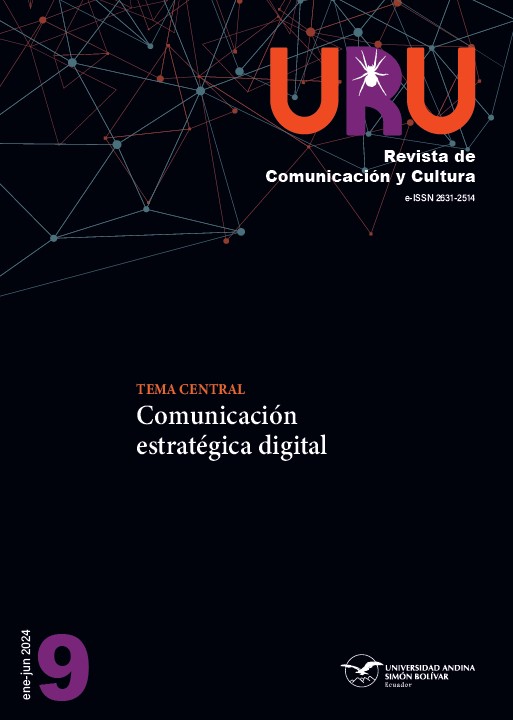Political Radicalization and Emotions: The Transfer of the PP Vote to VOX
DOI:
https://doi.org/10.32719/26312514.2024.9.9Keywords:
Far right, emotions, VOX, political radicalization, SpainAbstract
The aim of this article is to elucidate the transfer of votes from the Popular Party to VOX, from the General Elections of April 2016 to the elections held in November 2019. Likewise, we will try to highlight how the emotional component is positioned as an explanatory factor of the vote for the extreme right-wing formation in Spain. For this purpose, a quantitative analysis will be carried out based on the data from the survey conducted by the Political Research Team of the University of Santiago de Compostela. The focus will be on positive emotions (presence and intensity) towards Pablo Casado, leader of the PP until 2022, and towards Santiago Abascal, leader of VOX. Likewise, the emotions of both electorates towards the two political formations indicated will also be analyzed. The main results show a clear emotional profile of the voters of the extreme right in Spain, both towards their leader and the party. With respect to the transfer of votes, it can be seen that the main source of votes for the extreme right comes from the PP.
Downloads
References
Akkerman, Tjitske, Sarah de Lange y Matthijs Rooduijn, ed. 2016. Radical Right-Wing Populist Parties in Western Europe: Into the Mainstream? Londres: Routledge. https://doi.org/10.4324/9781315687988. DOI: https://doi.org/10.4324/9781315687988
Alonso, Sonia, y Cristóbal Rovira. 2014. “Spain: No Country for the Populist Radical Right?”. South European Society and Politics 20 (1): 21-45. https://doi.org/10.1080/13608746.2014.985448. DOI: https://doi.org/10.1080/13608746.2014.985448
Antón, Joan, y Aitor Hernández. 2016. “El crecimiento electoral de la derecha populista en Europa: Parámetros ideológicos y motivaciones sociales”. Política y Sociedad 53 (1): 17-28. https://doi.org/10.5209/rev_POSO.2016.v53.n1.48456. DOI: https://doi.org/10.5209/rev_POSO.2016.v53.n1.48456
Arzheimer, Kai. 2018. “Conceptual Confusion Is Not Always a Bad Thing: The Curious Case of European Radical Right Studies”. En Demokratie und Entscheidung: Beiträge zur Analytischen Politischen Theorie, editado por Karl Marker, Annette Schmitt y Jürgen Sirsch, 23-40. Wiesbaden, DE: Springer. https://doi.org/10.1007/978-3-658-24529-0_3. DOI: https://doi.org/10.1007/978-3-658-24529-0_3
Bélanger, Éric. 2004. “Antipartyism and Third-Party Vote Choice: A Comparison of Canada, Britain and Australia”. Party Politics 37 (9): 1054-78. https://doi.org/10.1177/0010414004268847. DOI: https://doi.org/10.1177/0010414004268847
Betz, Hans-Georg. 1990. “Politics of Resentment: Right-Wing Radicalism in West Germany”. Comparative Politics 23 (1): 45-60. https://doi.org/10.2307/422304. DOI: https://doi.org/10.2307/422304
—. 1993. “The New Politics of Resentment: Radical Right-Wing Populist Parties in Western Europe”. Comparative Politics 25 (4): 413-27. https://doi.org/10.2307/422034. DOI: https://doi.org/10.2307/422034
—. 1994. Radical Right-Wing Populism in Western Europe. Londres: Palgrave Macmillan. https://doi.org/10.1007/978-1-349-23547-6. DOI: https://doi.org/10.1007/978-1-349-23547-6
—. 2001. “Exclusionary Populism in Austria, Italy and Switzerland”. International Journal. Canada’s Journal of Global Policy Analysis 56 (3): 393-420. https://doi.org//10.1177/002070200105600302. DOI: https://doi.org/10.1177/002070200105600302
—. 2002. “Conditions Favoring the Success and Failure of Radical Right-Wing Populist Parties in Contemporary Democracies”. En Democracies and the Populist Challenge, editado por Yves Mény y Yves Surel, 197-213. Londres: Palgrave Macmillan. https://tinyurl.com/47k9kp9w.
—, y Carol Johnson. 2004. “Against the Current—Stemming the Tide: The Nostalgic Ideology of the Contemporary Radical Populist Right”. Journal of Political Ideologies 9 (3): 311-27. https://doi.org/10.1080/1356931042000263546. DOI: https://doi.org/10.1080/1356931042000263546
Campbell, Angus, Philip Converse, Warren Miller y Donald Stokes. 1960. The American Voter. Nueva York: Wiley.
Carter, Elisabeth. 2005. The Extreme Right in Western Europe. Nueva York: Manchester University Press.
Casals, Xavier. 2004. “La extrema derecha en España (1945-2005)”. En La extrema derecha en Europa desde 1945 hasta nuestros días, editado por Miguel Ángel Simón, 473-97. Madrid: Tecnos.
Eatwell, Roger. 2018. “Charisma and the Radical Right”. En The Oxford Handbook of the Radical Right, editado por Jens Rydgren, 251-68. Oxford: Oxford University Press. https://doi.org/10.1093/oxfordhb/9780190274559.013.13. DOI: https://doi.org/10.1093/oxfordhb/9780190274559.013.13
Ferreira, Carles. 2019. “VOX como representante de la derecha radical en España: Un estudio sobre su ideología”. Revista Española de Ciencia Política 51: 73-98. https://doi.org/10.21308/recp.51.03. DOI: https://doi.org/10.21308/recp.51.03
Gougou, Florent, y Nonna Mayer. 2013. “The Class Basis of Extreme Right Voting in France: Generational Replacement and the Rise of New Cultural Issues (1984-2007)”. En Class Politics and the Radical Right, editado por Jens Rydgren, 156-72. Londres: Routledge. https://tinyurl.com/2wtztzd4.
Hainsworth, Paul. 2008. The Extreme Right in Western Europe. Londres: Routledge. https://doi.org/10.4324/9780203965054. DOI: https://doi.org/10.4324/9780203965054
Ignazi, Piero. 1992. “The Silent Counter?Revolution: Hypotheses on the Emergence of Extreme Right?Wing Parties in Europe”. European Journal of Political Research 22 (1): 3-34. https://doi.org/10.1111/j.1475-6765.1992.tb00303.x. DOI: https://doi.org/10.1111/j.1475-6765.1992.tb00303.x
—. 2003. Extreme Right Parties in Western Europe. Oxford: Oxford University Press. https://doi.org/10.1093/0198293259.001.0001. DOI: https://doi.org/10.1093/0198293259.001.0001
Inglehart, Ronald, y Pippa Norris. 2017. “Trump and the Populist Authoritarian Parties: The Silent Revolution in Reverse”. Perspectives in Politics 15 (2): 443-53. https://doi.org/10.1017/S1537592717000111. DOI: https://doi.org/10.1017/S1537592717000111
Jagers, Jan, y Stefaan Walgrave. 2007. “Populist as Political Communication Style: An Empirical Study of Political Parties’ Discourse in Belgium”. European Journal of Political Research 46 (3): 319-45. https://tinyurl.com/2ex385jn. DOI: https://doi.org/10.1111/j.1475-6765.2006.00690.x
Jaráiz, Erika, Ángel Cazorla y María Pereira, eds. 2020. El auge de la extrema derecha en España. Valencia, ES: Tirant lo Blanch.
—, Nieves Lagares y María Pereira. 2020. “Emociones y decisión de voto: Los componentes de voto en las elecciones generales de 2016 en España”. Revista Española de Investigaciones Sociológicas 170:115-36. https://tinyurl.com/ynw95bht.
—, José Manuel Rivera y Paloma Castro. 2020. “Extrema derecha o derecha radical: Por qué una nueva semántica”. En El auge de la extrema derecha en España, editado por Erika Jaráiz, Ángel Cazorla y María Pereira, 53-88. Valencia, ES: Tirant lo Blanch.
Kitschelt, Herbert. 1995. The Radical Right in Western Europe: A Comparative Analysis. Ann Arbor, US: University of Michigan Press. https://doi.org/10.3998/mpub.14501. DOI: https://doi.org/10.3998/mpub.14501
Lagares, Nieves, y Paloma Castro. 2020. “La identificación emocional de la extrema derecha”. En El auge de la extrema derecha en España, editado por Erika Jaráiz, Ángel Cazorla y María Pereira, 189-226. Valencia, ES: Tirant lo Blanch.
—, María Pereira y Erika Jaráiz. 2022. “La construcción emocional de la identificación partidista: El caso de las elecciones generales de 2016 en España”. REIS. Revista Española de Investigaciones Sociológicas 179: 39-58. https://tinyurl.com/3fa43frv.
López, Alfonso, y Gabriel Colomé. 2020. “La extrema derecha hoy: De Europa a España”. En El auge de la extrema derecha en España, editado por Erika Jaráiz, Ángel Cazorla y María Pereira, 21-51. Valencia, ES: Tirant lo Blanch.
López López, Paulo C., y Serafín González. 2020. “Temas, discurso y emociones en la extrema derecha europea: El caso de VOX en España”. En El auge de la extrema derecha en España, editado por Erika Jaráiz, Ángel Cazorla y María Pereira, 419-47. Valencia, ES: Tirant lo Blanch.
Marcus, George, Russell Neuman y Michael Mackuen. 2000. Affective Intelligence and Political Judgement. Chicago: Chicago University Press.
Mayer, Nonna. 2002. Ces français qui votent Le Pen. París: Flammarion.
—. 2014. “The Electoral Impact of the Crisis on the French Working Class: More to the Right?”. En Mass Politics in Tough Times: Opinions, Votes, and Protest in the Great Recession, editado por Nancy Bermeo y Larry Bartels, 266-96. Oxford: Oxford University Press.
Miller, Warren, y Merrill Shanks. 1996. The New American Voter. New Haven, US: Yale University Press.
Mudde, Cas. 1996. “The Paradox of the Anti-Party Party: Insights from the Extreme Right”. Party Politics 2 (2): 265-76. https://doi.org/10.1177/1354068896002002006 DOI: https://doi.org/10.1177/1354068896002002006
—. 2004. “The Populist Zeitgeist”. Government and Opposition 39 (4): 541-63. https://doi.org/10.1111/j.1477-7053.2004.00135.x. DOI: https://doi.org/10.1111/j.1477-7053.2004.00135.x
—. 2007. Populist Radical Right Parties in Europe. Cambridge, US: Cambridge University Press. https://doi.org/10.1017/CBO9780511492037. DOI: https://doi.org/10.1017/CBO9780511492037
—. 2010. “The Populist Radical Right: A Pathological Normalcy”. West European Politics 33 (6): 1167-86. https://doi.org/10.1080/01402382.2010.508901. DOI: https://doi.org/10.1080/01402382.2010.508901
—. 2014. “Fighting the System? Populist Radical Right Parties and Party System Change”. Party Politics 20 (2): 217-26. https://doi.org/10.1177/1354068813519968. DOI: https://doi.org/10.1177/1354068813519968
—. 2016. The Study of Populist Radical Right Parties: Towards a Fourth Wave. C-REX Working Paper Series 1, septiembre. https://tinyurl.com/mrpwuppp.
—, ed. 2017. The Populist Radical Right: A Reader. Londres: Routledge. https://doi.org/10.4324/9781 315514574.
—. 2019. The Far Right Today. Cambridge, US: Polity.
Norris, Pippa, y Ronald Inglehart. 2019. Cultural Backlash: Trump, Brexit, and Authoritarian Populism. Nueva York: Cambridge University Press. https://doi.org/10.1017/9781108595841. DOI: https://doi.org/10.1017/9781108595841
Oñate, Pablo, María Pereira y Diego Mo Groba. 2022. “Emociones y voto a VOX en las elecciones generales españolas de abril y noviembre de 2019”. Revista Española de Ciencia Política 58: 53-81. https://doi.org/10.21308/recp.58.02. DOI: https://doi.org/10.21308/recp.58.02
Pereira, María, Nieves Lagares, y Paulo López. 2021. “Partidos y líderes en las elecciones generales de 2016 y 2019: Una visión emocional”. Revista de Estudios Políticos 193: 213-49. https://doi.org/10.18042/cepc/rep.193.07 DOI: https://doi.org/10.18042/cepc/rep.193.07
—, Nieves Lagares y Diego Mo. 2021. “Actitudes populistas, voto y emociones en España tras la irrupción de Vox”. En Política, sociedad y tecnología, coordinado por José Rúas, Paulo López e Iván Puentes, 43-68. Valencia, ES: Tirant lo Blanch.
Vasilopoulos, Pavlos, George Marcus, Nicholas Valentino y Martial Foucault. 2019. “Fear, Anger, and Voting for the Far Right: Evidence From the November 13, 2015 Paris Terror Attacks”. Political Psychology 40 (4): 679-704. https://doi.org/10.1111/pops.12513. DOI: https://doi.org/10.1111/pops.12513
Downloads
Published
How to Cite
Issue
Section
License
Copyright (c) 2024 Uru: Revista de Comunicación y Cultura

This work is licensed under a Creative Commons Attribution-NonCommercial-ShareAlike 4.0 International License.
ASSIGNMENT OF RIGHTS, DECLARATION OF CONFLICT OF INTEREST AND DISSEMINATION
The authors who publish in this journal accept the following conditions:
- Authors retain copyright and grant the journal the right of first publication, with the work registered under the Creative Commons Attribution-NonCommercial-ShareAlike 4.0 License, which allows sharing, adapting and attributing the work (see: Open Access Policies).
- Authors can make other independent and additional contractual agreements for the distribution of the article published in this journal (e.g., include it in an institutional repository or publish it in a book) as long as they expressly indicate that the article was published for the first time in Uru: Revista de Comunicación y Cultura. In the case of reproduction, a note similar to the following must be included: This text was originally published in the journal Uru: Revista de Comunicación y Cultura N ° -, year of publication.
- Authors are encouraged to publish their work on the Internet (e.g. on institutional or personal pages) in the final version published by Uru: Revista de Comunicaicón y Cultura as it may lead to a wider and faster dissemination of the published work.








